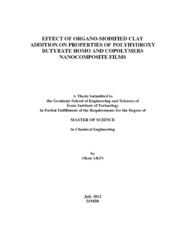Please use this identifier to cite or link to this item:
https://hdl.handle.net/11147/3492Full metadata record
| DC Field | Value | Language |
|---|---|---|
| dc.contributor.advisor | Tıhmınlıoğlu, Funda | - |
| dc.contributor.author | Akın, Okan | - |
| dc.date.accessioned | 2014-07-22T13:51:40Z | - |
| dc.date.available | 2014-07-22T13:51:40Z | - |
| dc.date.issued | 2012 | - |
| dc.identifier.uri | http://hdl.handle.net/11147/3492 | - |
| dc.description | Thesis (Master)--Izmir Institute of Technology, Chemical Engineering, Izmir, 2012 | en_US |
| dc.description | Includes bibliographical references (leaves: 105-112) | en_US |
| dc.description | Text in English; Abstract: Turkish and English | en_US |
| dc.description | xiii, 141 pages | en_US |
| dc.description.abstract | As an alternative to conventional non-degradable food packaging plastics, bionanocomposites, based on bacterial biodegradable thermoplastic polyesters, poly(hydroxybuthyrate) (PHB) and poly(hydroxybutyrate-covalerate) (PHBHV) polymers incorporated with commercial organomodified monmorillonite (OMMT) were prepared by solution intercalation and melt-mixing techniques. The enhancements in barrier, mechanical, thermal, surface and optical properties of resulting nanocomposite films were evaluated as effected by OMMT concentration and preparation method. The degree of dispersion of layered silicates into polymer matrix was evaluated by X-Ray diffraction (XRD) analyses. The best level of dispersion was obtained in nanocomposites that contain 1%w/w of OMMT. However, intercalated structure was observed at higher amount of clay loaded composites. The fine delamination of OMMT in PHB and PHBHV matrix was found to be responsible for the improvements in water vapor barrier performance since more tortuous path formed for permeation of water vapor. Moreover, enhancement in mechanical and thermal properties was highly depending on the dispersion level of layered silicates which is in good accordance with structural analyses. Addition of 2%w/w of OMMT reduced the WVP of virgin films by 41.1%. Meanwhile, improvements were less significant at higher amount of clay loaded samples due to weak interaction between polymer and layered silicates. Moreover, significant improvements in mechanical properties including doubled tensile strength and 69% increase in strain at break were obtained for 2%w/w of OMMT incorporated PHB composites. In addition, significant enhancement in thermal stability, which is the major drawback of PHB films, was obtained in nanocomposites, decomposition temperature increased by 10 oC compared to pristine polymers. Moreover, addition of layered silicates into polymer matrix at low content resulted in increase in erosion rate which makes nanocomposites more eco-friendly promising alternative to conventional barrier packaging systems. | en_US |
| dc.language.iso | en | en_US |
| dc.publisher | Izmir Institute of Technology | en_US |
| dc.rights | info:eu-repo/semantics/openAccess | en_US |
| dc.subject.lcsh | Polymers--Biodegradation | en |
| dc.subject.lcsh | Nanocomposites (Materials) | en |
| dc.subject.lcsh | Nanoparticles | en |
| dc.subject.lcsh | Edible coatings | en |
| dc.title | Effect of Organo-Modified Clay Addition on Properties of Polyhydroxy Buttrate Homo and Copolymers Nanocomposite Films | en_US |
| dc.type | Master Thesis | en_US |
| dc.institutionauthor | Akın, Okan | - |
| dc.department | Thesis (Master)--İzmir Institute of Technology, Chemical Engineering | en_US |
| dc.relation.publicationcategory | Tez | en_US |
| dc.identifier.wosquality | N/A | - |
| dc.identifier.scopusquality | N/A | - |
| item.openairecristype | http://purl.org/coar/resource_type/c_18cf | - |
| item.languageiso639-1 | en | - |
| item.openairetype | Master Thesis | - |
| item.grantfulltext | open | - |
| item.fulltext | With Fulltext | - |
| item.cerifentitytype | Publications | - |
| Appears in Collections: | Master Degree / Yüksek Lisans Tezleri | |
Files in This Item:
| File | Description | Size | Format | |
|---|---|---|---|---|
| T001036.pdf | MasterThesis | 7.1 MB | Adobe PDF |  View/Open |
CORE Recommender
Page view(s)
178
checked on Mar 31, 2025
Download(s)
116
checked on Mar 31, 2025
Google ScholarTM
Check
Items in GCRIS Repository are protected by copyright, with all rights reserved, unless otherwise indicated.